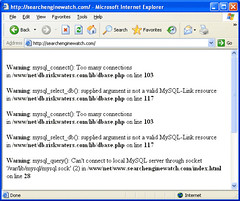MicroSoft’s Ms. Dewey Linkbait: Avatars for Blogs & Other Uses
MicroSoft has launched an avatar-fronted search interface called
Ms. Dewey, in order to promote their MS Live search service. An avatar is a term coopted from virtual reality which is used to describe the graphic representation of a person within the VR environment.
The Ms. Dewey avatar is a clever piece of Flash engineering coupled up with various video files and the MS Live search engine. Ms. Dewey is played by an actress named Janina Gavankar, who apparently prerecorded a bunch of video snippets which are queued up contextually for various responses to search terms that are typed into the submission form field. After you submit a search keyword, she says (and sometimes does) something witty, then the MS Live search results scroll down in an AJAX menu beside her.
Try out these particularly funny search terms on Ms. Dewey:
| Congress gmail President Bush Dick Cheney weather forecasts Yo Mama |
Painting Lord of the Rings UFOs MySpace FireFox Halo 2 |
A “share this with a friend” link is included, making this qualify even more as some nice linkbait, as some online marketing folx refer to it. While quite a few folx have turned their noses up at Ms. Dewey as not being a serious search service contender, they’re perhaps missing the point that she’s pretty fun to interact with, and as a promotional effort goes, it’s probably pretty effective linkbait. Within just a short timeframe, many people will have emailed links to Ms. Dewey to their friends, getting a whole lot of people to use MicroSoft’s search engine who otherwise wouldn’t have tried it out.
I’d only say that the design group has dropped the ball a bit by not highlighting their MS Live brandname on the search results. (They also dropped the ball by advertising Ms. Dewey’s email address through the interface, ms-dewey@hotmail.com, because it’s inoperative, at least when I tested it. “Status: 5.0.0 – Remote SMTP server has rejected address”. They should have had someone responding to those notes, or they should’ve created an intelligent agent to respond to submissions to it.)
It’s maybe mentionable that Ask dropped the Jeeves butler mascot from the frontend of their search earlier this year, and here MicroSoft is adding a human mascot onto their search. Ask was never this attractive, though, and this ploy doesn’t seem in the least retro. Slick!
Interfaces like Ms. Dewey actually aren’t all that hard to do, and there’s one company that has made it really easy to incorporate interactive avatars similar to this within your blogs and other websites. Read on and I’ll describe how you can use avatars.
Possible Related Posts
Posted by Chris of Silvery on 10/30/2006
Permalink | |  Print
| Trackback | Comments Off on MicroSoft’s Ms. Dewey Linkbait: Avatars for Blogs & Other Uses | Comments RSS
Print
| Trackback | Comments Off on MicroSoft’s Ms. Dewey Linkbait: Avatars for Blogs & Other Uses | Comments RSS
Filed under: Link Building, Marketing, MSN Search avatars, linkbait, MS-Live, virtual-reality, VR
Brave New Future of SEO & SEM? Marketing thru Second Life
I came to hear about Second Life after reading about it in a blog by Greg Sterling, former editor and director of the Kelsey Group’s Interactive Local Media program. If you haven’t heard about it, read about it in this article. Second Life is basically a virtual reality (“VR”) platform (or, “world”, or “metaverse” if you will). People go in there, buy VR property or other objects, and interact with thousands of other participants.

“So what?” you might say. So, how does this differ from World of Warcraft, the Sims Online, or EverQuest?
First, there’s no goal to Second Life, per se — users just go into the thing, hang out, and interact with other users and the virtual environments. Second, users can own property in this world, and they can sell the property for real money in the real world! (Contrast with EverQuest, where they’ve actively worked to keep people from selling characters on eBay and such.) Finally, people have begun marketing through this new media — like gangbusters!

Copyright 2006, Linden Research, Inc. All Rights Reserved.
People like Anshe Chung are now making hundreds of thousands of dollars per year by designing and selling the SL virtual real estate. Others are offering services like architecture, event planning, selling artworks, scripting, and even financial or legal services. Some universities are now teaching within the space, too!
Possible Related Posts
Posted by Chris of Silvery on 10/24/2006
Permalink | |  Print
| Trackback | Comments Off on Brave New Future of SEO & SEM? Marketing thru Second Life | Comments RSS
Print
| Trackback | Comments Off on Brave New Future of SEO & SEM? Marketing thru Second Life | Comments RSS
Filed under: Futurism, Marketing, Search Engine Optimization, SEO online-marketing, Second-Life, SEM, SEO, virtual-reality, VR
Update: Sullivan still to be involved in SES
Last night I noted that SearchEngineWatch briefly cratered as some sort of early apocalyptal sign of things to come after Danny Sullivan’s earlier announcement that he would be leaving SEW behind, and that he wouldn’t be involved in Search Engine Strategies Conferences in 2007.
Now for instant turnabouts: Sullivan announced just this morning that Incisive Media worked out some details with him at the eleventh hour, so he’ll be chairing SES NY, co-chairing SES San Jose, and participating in the SES Chicago.
That’s great news for 2007!
Possible Related Posts
Posted by Chris of Silvery on 10/23/2006
Permalink | |  Print
| Trackback | Comments Off on Update: Sullivan still to be involved in SES | Comments RSS
Print
| Trackback | Comments Off on Update: Sullivan still to be involved in SES | Comments RSS
Filed under: Conferences, General Search-Engine-Watch, SES-Conference
SearchEngineWatch.com Cratered Briefly Tonight
Well, SearchEngineWatch.com apparently had a crash for a short period tonight, giving back pages that looked like this:
Ironically, this illustrates what many in the SEO industry felt would become of Search Engine Watch ever since Danny Sullivan announced he’d be leaving editorship of the site and the Search Engine Strategies Conferences.
Â
Possible Related Posts
Posted by Chris of Silvery on 10/22/2006
Permalink | |  Print
| Trackback | Comments Off on SearchEngineWatch.com Cratered Briefly Tonight | Comments RSS
Print
| Trackback | Comments Off on SearchEngineWatch.com Cratered Briefly Tonight | Comments RSS
Filed under: General danny-sullivan, Search-Engine-Watch, SearchEngineWatch
Verizon to Spin-Off Verizon Information Services & Superpages.com
Verizon’s official announcement regarding the spin-off plans came out just a short while ago. Verizon Communications Corp. is spinning off the business unit that I work for, Verizon Information Services, and its local information website, Superpages.com.
The new company’s name is “Idearc Inc.”, and it will operate under marks of “Idearc” and “Idearc Media“:
Â
I’m not allowed to make any sort of forward-sounding business statements in relation to this until the spin-off is completed, due to the usual SEC rules. This is one of the common-sense limits one must place on one’s self, if one is an employee who happens to blog in one’s personal time! 🙂 (Wow! That sounded inhuman and recursive, didn’t it!) While I am an employee of VIS, I’m not speaking here in any sort of official capacity for my company, and any interpretations I place here are completely my own viewpoint. Obviously, nothing I say should be used in making stock purchase/sale decisions!
Possible Related Posts
Posted by Chris of Silvery on 10/18/2006
Permalink | |  Print
| Trackback | Comments Off on Verizon to Spin-Off Verizon Information Services & Superpages.com | Comments RSS
Print
| Trackback | Comments Off on Verizon to Spin-Off Verizon Information Services & Superpages.com | Comments RSS
Filed under: Design, Marketing, Yellow Pages idearc, Idearc-Media, Local Search, Online-Yellow-Pages, Verizon-Information-Services, Yellow Pages
7 Tips for Achieving Online Brand Recognition
I’ve worked for Verizon SuperPages.com for about a decade now, and it’s always been a bit deflating when John Q. Public asks me where I work, I tell them “SuperPages.com” — and then there’s sometimes this faint look of incomprehension that crosses the person’s face as they fail to recognize the name. Oh, sure, they recognize the Verizon name, if I drop that — and they often tell me they use our wireless phone service or somesuch. But do they recognize “SuperPages.com”? Not always.
Why is it that our brand name doesn’t have wider recognition? I’d wonder. After all, our site has certainly been around long enough, and has been used by plenty of people. We’ve been one of the primary websites of a Fortune 10 company!
Well, maybe we finally reached the tipping point where this is concerned, earlier this year. We noticed that the SuperPages.com name was mentioned in the Sally Forth comic strip. Did we reach brand identifiability with this? Is having your brand name mentioned in popular culture media the sign that you’ve finally arrived — that your brand name is at last graduating into the coveted household brandname recogizability status that trademarks like Coca-Cola, Ford Motors, Wal-mart, and yes, even Google, have enjoyed?
It’s made me wonder what it takes to build and achieve a recognizable online brand in this day and age. How is it that a well-founded, major corporation like ours has worked for years, spending millions in promotion, while a relative upstart like Google can come along and zoom past us in brand recognition within just a few years?
I have some ideas on the subject which traditional marketers may not agree with, so read on and I’ll describe what I think it takes to make it into the mass consciousness.
Possible Related Posts
Posted by Chris of Silvery on 10/11/2006
Permalink | |  Print
| Trackback | Comments Off on 7 Tips for Achieving Online Brand Recognition | Comments RSS
Print
| Trackback | Comments Off on 7 Tips for Achieving Online Brand Recognition | Comments RSS
Filed under: Marketing Brand-Name-Recognition, Branding, Building-Online-Brands, Marketing
Google Book Search: Not a Threat to Publishing
It’s not surprising that large chunks of the book publishing industry have gotten up in arms ever since Google announced its intentions to scan the world’s books and make them available online for free. After all, the publishing industry is not really known for adopting modern practices all that quickly. Book publishing is a grand old industry, and top publishing houses seem more invested in preserving the status quo than in adapting for the changing world.
But, when the publishing industry got up in arms against Google’s plans to facilitate the searching of books, their knee-jerk reaction against the new paradigm caused them to miss the fact that Google’s basic proposal really isn’t all that revolutionary. There’s another institution that has taken published books and made them available to the public. For Free. For thousands of years. Libraries!
Possible Related Posts
Posted by Chris of Silvery on 10/08/2006
Permalink | |  Print
| Trackback | Comments Off on Google Book Search: Not a Threat to Publishing | Comments RSS
Print
| Trackback | Comments Off on Google Book Search: Not a Threat to Publishing | Comments RSS
Filed under: General, Google, Searching Amazon.com, book-search, Google-Book-Search, Publishing-Industry
Using Linkbaiting & Social Engineering to Get Tops on Digg
Seoblackhat posted a great article on Ten Steps to Guarantee You Make The Digg Front Page.
I like his tips particularly because he cites some methods that use social engineering or linkbait to gain Digg votes, and he also suggests using headlines which are more attractive to the big Digg demographics.
I’m calling some of Seoblackhat’s tips “social engineering” because he seems to’ve studied Digg users’ behavior, and quantified the sorts of titles and themes that would result in Digg users voting for an article.
Possible Related Posts
Posted by Chris of Silvery on 10/04/2006
Permalink | |  Print
| Trackback | Comments Off on Using Linkbaiting & Social Engineering to Get Tops on Digg | Comments RSS
Print
| Trackback | Comments Off on Using Linkbaiting & Social Engineering to Get Tops on Digg | Comments RSS
Filed under: Link Building, Social Media Optimization digg, linkbaiting, social-engineering
Hey Digg! Fix your domain name for better SEO traffic!
Hey, Digg.com team! Are you aware that your domain names aren’t properly canonized? You may be losing out on good ranking value in Google and Yahoo because of this!
Even if you’re not part of the Digg technical team, this same sort of scenario could be affecting your site’s rankings. This aspect of SEO is pretty simple to address, so don’t ignore it and miss out on PageRank that should be yours. Read on for a simple explanation.
Possible Related Posts
Posted by Chris of Silvery on 10/04/2006
Permalink | |  Print
| Trackback | Comments Off on Hey Digg! Fix your domain name for better SEO traffic! | Comments RSS
Print
| Trackback | Comments Off on Hey Digg! Fix your domain name for better SEO traffic! | Comments RSS
Filed under: Search Engine Optimization, SEO, Social Media Optimization, URLs digg, Google, PageRank, SEO, url-canonization, Yahoo
Dr. Paul W.K. Rothemund and Dr. Eric Winfree awarded the Feynman Prize at nanoTX Conference
Dr. Paul W.K. Rothemund and Dr. Eric Winfree were awarded the 2006 Foresight Institute Feynman Prizes at the nanoTX Conference last week, at a special awards reception. (I earlier blogged about H. Ross Perot’s keynote address at this conference.)
Rothemund was on-hand to receive the award, and I was fortunate to be able to attend his presentation on his and Winfree’s research. Rothemund delivered first a presentation on his work, and then he delivered a presentation on behalf of Winfree who could not attend.
Rothemund’s work is fantastic — he works upon Algorithmic Self-Assembly. He’s been able to program long strands of viral DNA such than when mixed in a suspension with other short DNA snippets (and heated slightly), the snippets or “staples” will bind to the long strand in particular order, causing it to fold back upon itself to form precise shapes. Rothemund has nicknamed what he does as “DNA Origami”, although the key concept is the ability to program the DNA to order itself into near two-dimensional, or even three-dimensional shapes. As proof of concept, Rothemund has programmed DNA to fold itself into words, stars, smiley faces, and other shapes.

Smiley composed of one long DNA strand
The staple snippets of DNA are not shown in this representation.
(Illustration copyright 2006 by Chris Silver Smith.)
Possible Related Posts
Posted by Chris of Silvery on 10/02/2006
Permalink | |  Print
| Trackback | Comments Off on Dr. Paul W.K. Rothemund and Dr. Eric Winfree awarded the Feynman Prize at nanoTX Conference | Comments RSS
Print
| Trackback | Comments Off on Dr. Paul W.K. Rothemund and Dr. Eric Winfree awarded the Feynman Prize at nanoTX Conference | Comments RSS
Filed under: Futurism, General, technology Algorithms, artificial-intelligence, DNA, future, Futurism, nano, nanotech





